Bichon Frise is a cheerful, happy and most affectionate dog that you will come across. It is very well known for complaint companionship, undeniable cuteness and readiness to play all day!
The name ‘Bichon Frise’ is derived from the French Language which literally translates to “curly lap dog”.
An average Bichon weighs about 3-6 kgs and is 30 cm tall. They are small in size which makes them the right choice for city dwellers.
Bichons are happy family dogs and can get along with other dogs and cats. They are perfect multi-pets and are great with babies too.
A Bichon Frise puppy sleeps for about 90% of the time in the first few weeks.
Their two-layered fur gives them a very puffed look, like a cotton ball. They are available in a few colors such as apricot, brown, black but the pure Bichon Frise breed is white.
This breed is originally from the Mediterranean and has been the favorites of the Spanish, English, and French in the past.
Bichons are hypoallergenic dogs, which means they are best suited for those who have animal fur allergies.
This breed arrived in the United States not less than 60 years ago.
Table of Contents
Quick Facts

Avg. Weight: 3-5 kgs.
Avg. Height: Male (30 cm), Female (30 cm).
Life Expectancy: 12-15 years.
Dog Group: Non-Sporting.
Colors: White, White with Cream, White with Buff, White and Apricot, and Grey.
At A Glance
SIZE (2/5)
The Bichon Frise is longer in length than in height.
It measures fairly about 30 cms, which is ideal for a small-sized dog and weighs about 3-6 kilograms.
AFFECTION (5/5)
This breed is extremely loving and caring which makes it an affectionate and friendly dog.
It is recommended for families that have other pets or small children.
These cute furry munchkins are alert and curious, which makes them good guard dogs but they are not known to treat people as strangers, they’re just friends.
APARTMENT FRIENDLY (5/5)
Bichons are small-sized and can adapt to surroundings easily, so they are perfect for city residents.
They have low tendencies to bark which makes them neighborhood friendly too.
COLD WEATHER TOLERABILITY (3/5)
Their thick hair coat keeps them warm during winter but despite their diminutive size, they are quite vulnerable to cold weather.
HOT WEATHER TOLERABILITY (4/5)
These pooches can tolerate hot temperatures up to a certain degree.
If the conditions get extremely hot, you might want to keep your dogs inside and take good care of them.
BARKING TENDENCIES (2/5)
Bichons are known to be playful and jolly but not loud. However, some tend to bark a lot, their barking tendencies are moderate.
They can be trained to not bark too much if they are discouraged from doing so in the early stages.
CAT FRIENDLINESS (3/5)
They get along with cats pretty well. Provided the cat isn’t arrogant or stubborn by nature.
So, if you are a cat owner who’s looking to add a dog member to your family, Bichons are the right choice for you.
DOG FRIENDLINESS (5/5)
They easily befriend other dogs, play and live with them as long as they are pampered and attended to by their master.
Once nicely established, they develop love and affection for their kind.
EXERCISE NEEDS (3/5)
Bichons are lively, hopping around the house dogs.
20-30 mins of exercise a day is advised.
Two walks around the block, a few games of fetch meet the exercise requirements.
They need to be taught games and tricks for mental stimulation.
GROOMING NEEDS (2/5)
Having a thick coat of dense corkscrew curls, it can sometimes be difficult to brush their hair.
Although, they must be brushed regularly to avoid matting or clamping of fur.
The plus side to this is that they do not shed hair easily but need to be groomed, bathed and professionally clipped monthly.
PLAYFULNESS (5/5)
Bichons are active and playful. They enjoy sitting in laps too and are always in need of attention.
They also are eager to please and impress their masters with their learned tricks and pieces of training.
TRAINABLITIY (3/5)
Bichons can be difficult to train. In their early stages, they can be well trained as puppies. They love to impress their masters.
You can read more about puppy training to avoid any mistakes in the puppy’s growing period.
As dogs do not poop where they sleep/eat, catering training is very important and must be introduced from their puppy years.
INTELLIGENCE (4/5)
Though naturally gentle and agile, Bichons are also very intelligent, independent and confident dogs.
They can be street performers too if they are trained well!
They are amazing showstoppers and respond well to training.
MOUTHINESS (3/5)
They are prone to playful biting and chewing when they are teething. They do not drool or slobber.
They must be trained to understand that biting is not okay, so do not let them get comfortable.
PRICE (3/5)
An average well-bred Bichon Frise is priced between 500$-1000$.
About Bichon Frises
These active furballs have their heads proportionate to their body, have pronounced black noses.
Their skull is slightly rounded and they have drop ears, with black l
They are indeed small in size but have a very sturdy physique. They are extremely fast runners and enjoy the activity.
The powder puff appearance makes them undoubtedly adorable but they are low shedders. Their coat, however, is coarse and creates a soft but substantial texture.
Bichon Frise lifespan is of 12-15 years.
They train nicely and enjoy human affection. They are eager to impress their owners and have extremely admirable qualities.
Where Bichon Frise Came From?

This Mediterranean small dog breed was created in the 13th century by mixing the Water Spaniel and the Standard Spaniel.
Bichon Frise belongs to the Barbichon family of dogs. They were divided into four categories: Bichons, Bolognese, Havanese, and Maltese.
Size
A standard Bichon Frise dog, male or female, is about 30 cms tall and weighs somewhere between 3-6 kgs.
Trainability
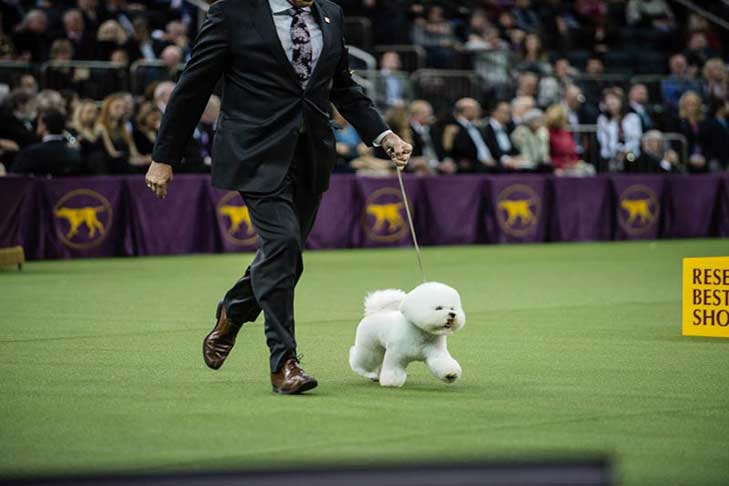
Some Bichon Frises are easy to train, hard to housebreak.
You need to be extremely patient and tolerant to train your dog but it is not impossible.
Taking your dog out on frequent walks, correcting bad habits and crate training can help make your training easier.
They are obedient dogs who love to show off their skills and getting treats as rewards.
To potty train Bichon Frise you will need to start from an early age to avoid aggressive behavior later in their adulthood.
Grooming

This breed has a double coat layer, the first or the inner coat is always white.
Bichons are known for not shedding their hair, which is not quite accurate.
All animals with fur experience shedding but Bichon Frise shed lesser as the second coat hinders the shedding.
A standard Bichon Frise haircut for this breed is a trim that outlines the body but also gives a “poufy” look.
You should clip your dog’s nails monthly by a professional and brush their fur daily to prevent matting.
Common Diseases
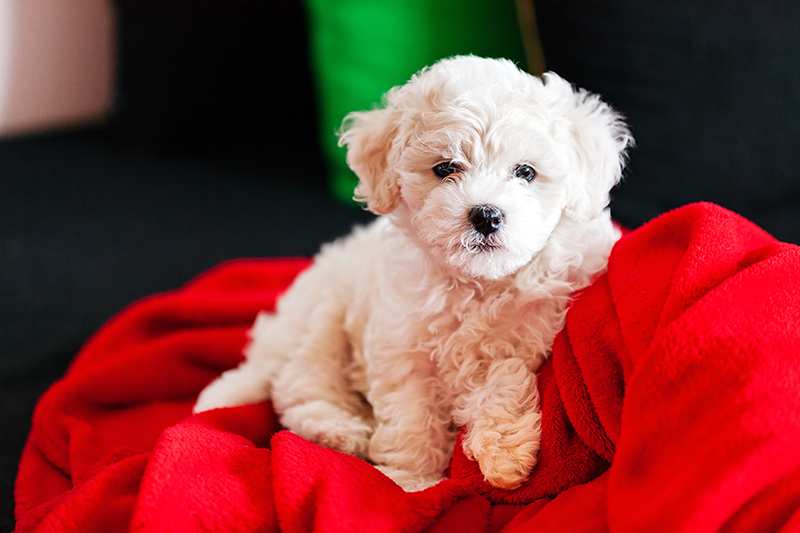
Every dog is prone to some or other diseases. Here are a few health issues with Bichon Frise:
TARGETING THE BONES:
Hip and Elbow Dysplasia
The hip is a ball-and-socket joint. Hip Dysplasia is very dangerous and weakening.
It occurs when the ball does not fit in the socket of the joint, causing terrible pain and limiting mobility.
Symptoms include difficulty in getting up, unwillingness to climb stairs, pain while getting up and down and a labored gait.
A Bichon’s expectancy of having hip dysplasia solely depends on the parents.
TARGETING THE SKIN
Parasites
Bugs and worms of all sorts can invade a Bichon’s body inside and out.
Fleas, ticks, ear mites can invade and infest their skin and this might cause rashes and extensive itching sometimes, even death.
TARGETING THE BODY
Kartangener’s Syndrome
This condition is a rare immune system disease and occurs quite frequently in Bichons.
It is associated with abnormal retention of mucus and bacteria in the respiratory tract.
Symptoms include frequent respiratory infections and immediate antibiotic therapy is required.
Patellar Luxation
A very common issue health issues among small-sized breeds including Bichon Frise. When the patella is luxated, it can’t return to its normal position unless the quadricep of the dog relaxed and increases in length.
The dog is in severe pain due to this, especially while trying to move.
This could lead to arthritic crippling if left untreated.
TARGETING THE EYES
Cataract
This is less common in dogs and cats than humans, but occur frequently and could lead to blindness.
They are very common among small-sized breeds like the Bichon Frise.
Cataract formation is the covering of the pupil with a grey almost whiteish layer, it causes opacification of the eye.
A completely opaque eye could result in blindness.
TARGETING THE EARS
Ear Infections
Bichons are very prone to ear infections due to the profuse hair in the ear canals.
An easy way to prevent this from happening is to keep the hair short and trimmed at all times.
Feeding
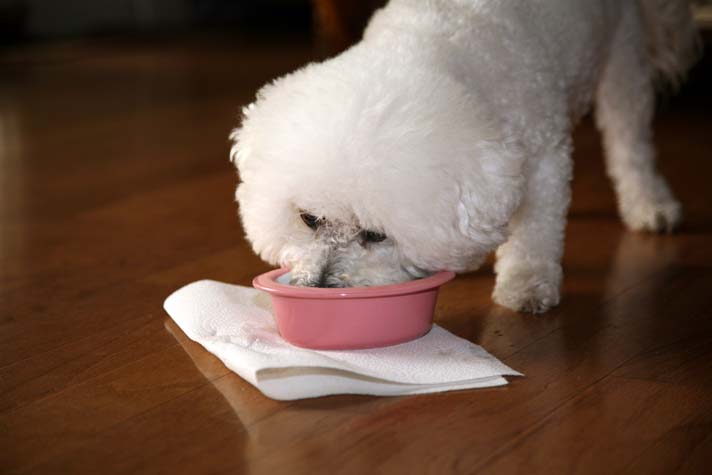
It is advised to have the Bichon’s food bowl away from human dining areas.
Consult a vet for feeding your dog, its frequency and portion size. Ask the shelter or the breeder about the food and where you can buy it.
One must feed a Bichon four times a day till it is 3 months old.
Feed your dog three times a day after it is 3-6 months old.
Feed twice a day after 6 months of age.
In summer or on hot days, your dog might want to eat only at nighttime. Make sure you only feed adult food and give them occasional treats.
Do not feed your dog the food that you eat. Here is our article on 46 foods that are toxic for your dog.
Suggested: Senior Dog Food
Vaccination

Distemper vaccine
Distemper is a viral vaccination that severely affects the organs of a Bichon such as the brain, intestines, respiratory systems, and spinal cord.
Symptoms of having distemper commonly include difficulty in breathing, loss of appetite, coughing, vomiting, diarrhea, high fever, eye inflammation, and slothfulness.
Parvo
This disease is transmitted through the dog’s infected hair or feet. This is a fatal disease.
Bichons under the age of 12 months are victims if this virus.
Symptoms may include depression, vomiting, fever, loss of appetite, bloody diarrhea.
Adenovirus
This virus causes respiratory problems infection and targets various organs of the Bichon’s body.
Symptoms include depression, vomiting, loss of appetite, cough, glaucoma.
Rabies
Rabies is a virus that damages the brains of mammals even cats and dogs etc. Dogs secrete a large amount of virus in their saliva and hence a dog is infected with rabies when it is bitten by another dog.
The risk is higher if your Bichon is bitten by a wild animal.
Symptoms may include extreme behavioral changes such as restlessness, apprehension or aggression. Friendly dogs tend to become more irritable.
Infected dogs become hypersensitive to touch, light, sound, etc.
Suggested: Guide To Dog Vaccination
Monthly Expense
An average Bichon Frise needs about 150$ a month for maintenance.
Behavior
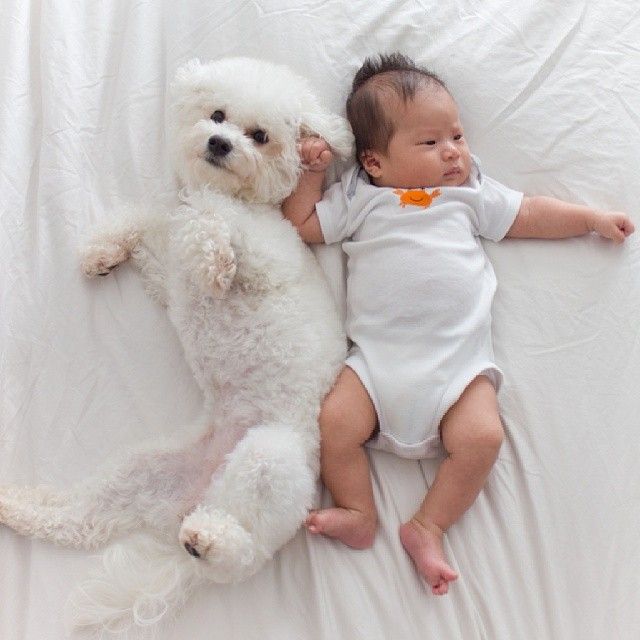
Kids
These powder puff dogs are known for their friendly behavior and especially caring nature with kids.
As kids are playful too, they complement each other in terms of energy and excitement. They like to play catch and rest in the laps of children.
Cats
They are receptive to other animals such as cats and are extremely friendly with them.
If introduced early in the puppy stages they learn to adapt to the other pets as well.
Dogs
This high-on-energy breed of dog does not engage too much with dogs of other species but engages with all because of their welcoming and jovial nature.
If the Bichon is sharing a home with another dog, it will be fine as long as the other dogs do not steal the master’s attention from him.
Overview
Bichons are a must-have in your home if you’re looking for a small member to join your family.
They are family dogs, good with children and get along with other cats and dogs too.
They are small but they are full of energy and happiness, they have a strong body type and enjoy a lot of physical activities.
Bichons sleep 90% of the time till they are a few weeks old. They loved to be noticed and perform their trained tricks to impress their owners and also like to be treated quite often.
Originated in the Mediterranean, in the 13th century, they were loved by the Spanish, English, and French.
Bichon Frises are a cross between the White Spaniel and the Standard Poodles.
Something Fun About Bichon Frises!
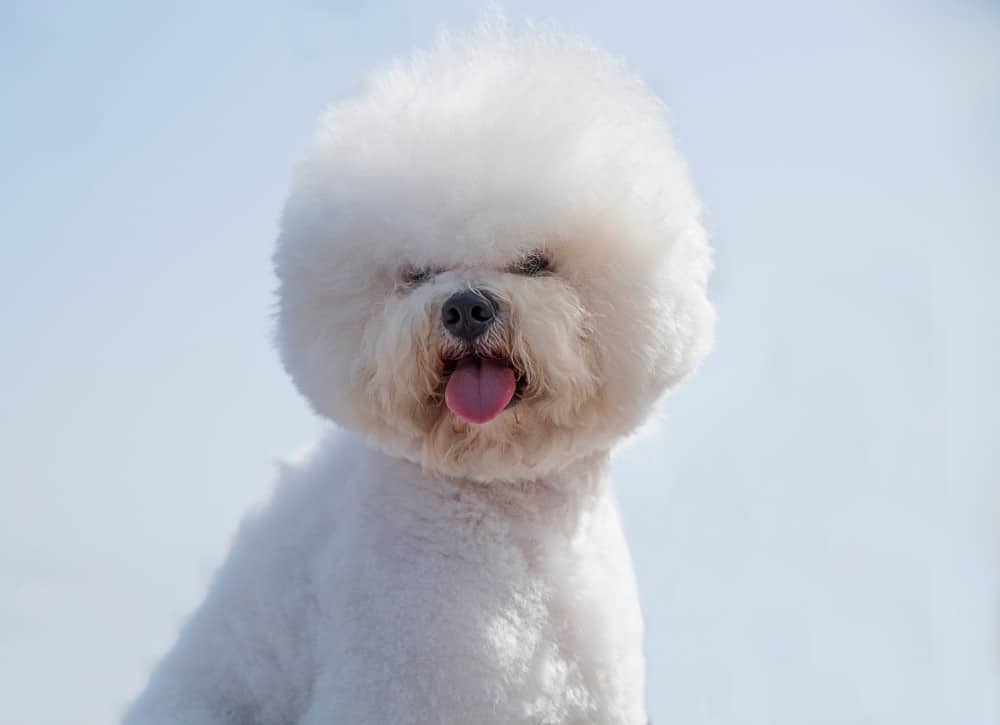
They are very social dogs and take pleasure in human company.
In the 14th century, Spanish sailors loved them so much because Bichons made great companions, they carried them around everywhere they went.
They were used as performance dogs in the 19th century because of their outgoing nature.
They were used as a means for bartering in centuries ago.
Although having traveled on the seas a lot, Bichons do not like to swim and are not friendly with water.
This was all about Bichon Frise.
Let us know about your thoughts in our comment section!
Stay with us to know more about dogs and dog breeds.



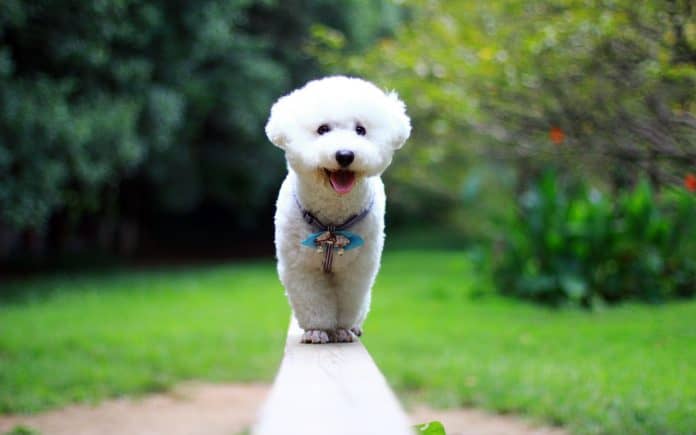

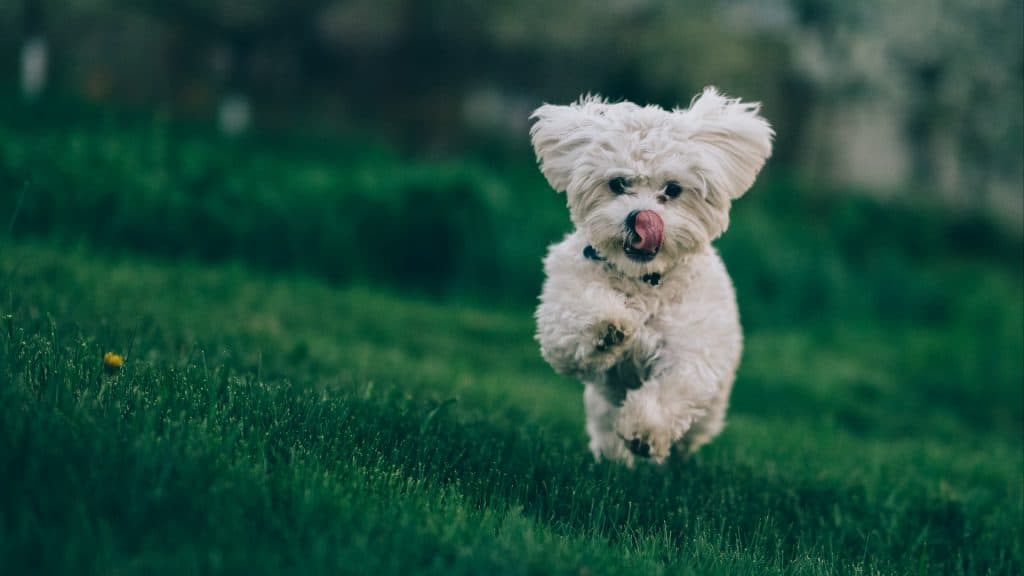
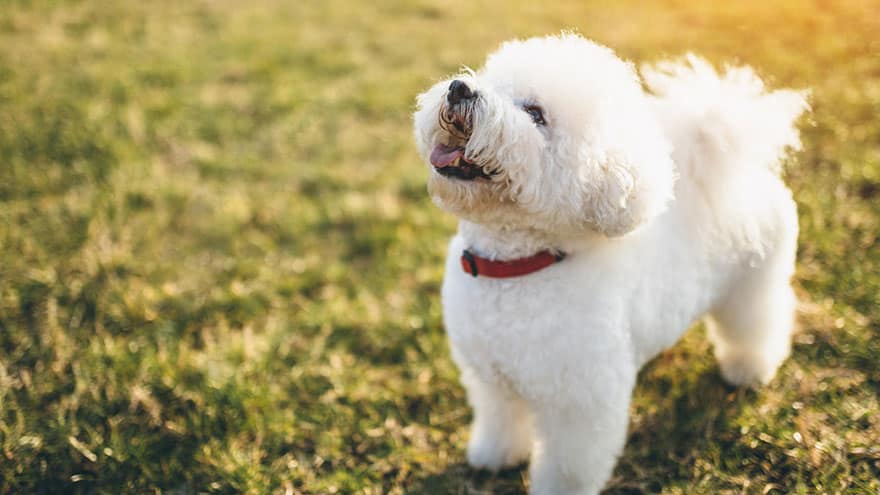








[…] Bichon Frise […]
[…] Bichon Frise […]
[…] Bichon Frise […]
[…] Bichon Frise […]